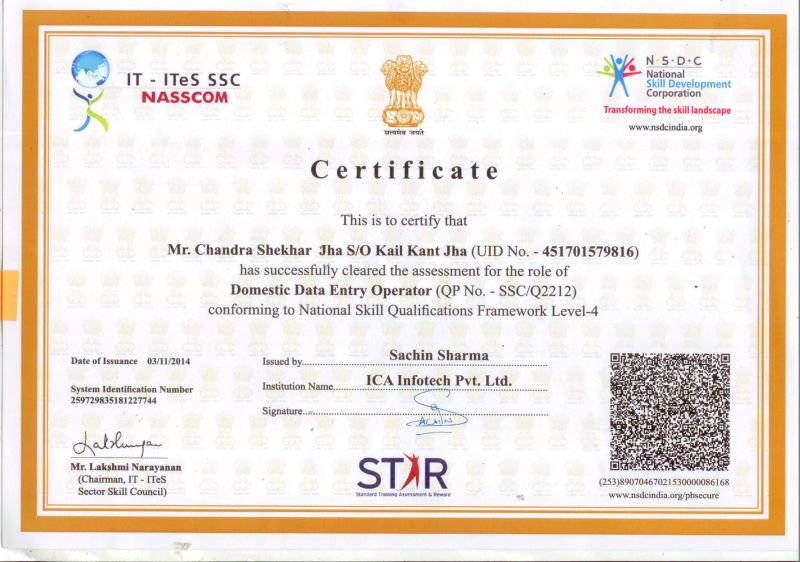In an age where digital literacy and proficiency in information technology are crucial for economic participation, it’s imperative to ensure that individuals with disabilities have equal access to opportunities for skill development and employment. The Pradhan Mantri Kaushal Vikas Yojana (PMKVY) is a flagship initiative by the Government of India aimed at enabling youth and vulnerable groups to acquire industry-relevant skills. Among the various courses offered under PMKVY, the SSC/Q2212 DOMESTIC DATA ENTRY OPREATOR , certified by the Skill Council for Persons with Disability (PWD), is specifically tailored to empower individuals with disabilities in the IT-ITeS sector.
NOS, or National Occupational Standards, form the backbone of skill development programs under PMKVY. They define the competencies required to perform a job role effectively. In the case of the Domestic Data Entry Operator course for individuals with disabilities, the NOS category falls under the purview of the Skill Council for Persons with Disability, focusing on the IT-ITeS sub-sector.
The Domestic Data Entry Operator course (QP Code: PWD/SSC/Q2212) is meticulously designed to equip individuals with disabilities with the necessary skills to excel in data entry roles within various domestic settings. The curriculum encompasses a blend of theoretical knowledge and practical training, ensuring holistic skill development.

- Basic Computer Skills: Understanding computer fundamentals, operating systems, and software applications relevant to data entry.
- Typing Proficiency: Enhancing typing speed and accuracy through targeted exercises.
- Data Entry Techniques: Learning efficient data entry techniques, including alphanumeric entry, numeric entry, and text editing.
- Quality Control: Emphasizing the importance of accuracy and precision in data entry tasks.
- Accessibility Considerations: Sensitization to accessibility features and tools that aid individuals with disabilities in utilizing digital platforms effectively.
- Soft Skills Development: Cultivating communication skills, teamwork, and time management abilities essential for professional success.

- Tailored Curriculum: The course curriculum is meticulously crafted to accommodate the diverse needs and abilities of individuals with disabilities, ensuring inclusivity and accessibility.
- Qualified Instructors: Trainers possess expertise in both technical aspects and disability sensitization, fostering a supportive learning environment.
- Assistive Technologies: Leveraging assistive technologies such as screen readers, magnifiers, and speech recognition software to facilitate learning and skill acquisition.
- Practical Exposure: Hands-on training sessions and simulated real-world scenarios enable participants to apply acquired skills effectively.
- Certification: Upon successful completion of the course, participants receive a recognized certification, validating their competency as Domestic Data Entry Operators.
- Economic Empowerment: By acquiring in-demand skills, individuals with disabilities enhance their employability and income-earning potential, contributing to their economic independence.
- Social Inclusion: The course promotes social inclusion by fostering equal opportunities for participation in the workforce, thereby combating stigmatization and promoting diversity.
- Career Progression: Graduates of the course can pursue career opportunities in diverse sectors, ranging from government agencies and corporate entities to freelance platforms, with avenues for career advancement.
- Technological Literacy: Participants develop proficiency in utilizing digital technologies, empowering them to navigate an increasingly technology-driven world with confidence.
- Self-Reliance: Through skill development and empowerment, individuals with disabilities gain greater autonomy and self-reliance, enhancing their overall quality of life.
The PMKVY course in Domestic Data Entry Operator, offered by the Skill Council for Persons with Disability, exemplifies the government’s commitment to fostering inclusive growth and empowerment. By equipping individuals with disabilities with market-relevant skills, the course not only enhances their employability but also promotes their social integration and overall well-being. As we strive towards a more inclusive society, initiatives like these serve as catalysts for positive change, unlocking the potential of every individual, irrespective of their abilities.
- Understanding computer fundamentals
- Introduction to operating systems (Windows, Linux, MacOS)
- Basic navigation and file management
- Touch typing techniques
- Typing exercises to improve speed and accuracy
- Practice sessions using typing tutor software
- Alphanumeric data entry
- Numeric data entry
- Text editing and formatting
- Quality control measures in data entry
- Understanding accessibility features in operating systems and software
- Introduction to assistive technologies (screen readers, magnifiers, speech recognition software)
- Hands-on practice with assistive technologies
- Effective communication skills
- Teamwork and collaboration
- Time management techniques
- Problem-solving and critical thinking exercises
- Data Entry Services:
- Understanding the concept and importance of data entry services.
- Techniques for efficient and accurate data entry.
- Different types of data entry tasks and their applications.
- Quality control measures to ensure data accuracy and integrity.
- MS Office / Open Office:
- Proficiency in using Microsoft Office suite applications (Word, Excel, PowerPoint).
- Creating and formatting documents, spreadsheets, and presentations.
- Performing basic data analysis and manipulation in Excel.
- Utilizing advanced features such as mail merge and pivot tables.
- Browser:
- Navigating web browsers effectively to access information online.
- Searching for and retrieving relevant data from the internet.
- Understanding browser settings and preferences for personalized browsing experience.
- Identifying and mitigating online security risks and threats.
- Outlook / Email:
- Managing emails efficiently using Outlook or similar email clients.
- Composing, sending, and receiving emails.
- Organizing emails into folders and using filters for better management.
- Understanding email etiquette and best practices for professional communication.
- Self and Work Management:
- Developing self-management skills to prioritize tasks and meet deadlines.
- Time management techniques for maximizing productivity.
- Setting SMART (Specific, Measurable, Achievable, Relevant, Time-bound) goals and objectives.
- Stress management strategies to maintain well-being in the workplace.
- Managing Health and Safety:
- Understanding the importance of health and safety in the workplace.
- Identifying common hazards and risks associated with office environments.
- Adhering to health and safety protocols and regulations.
- Promoting a culture of safety through awareness and proactive measures.
- Continuous assessment throughout the course based on practical assignments, quizzes, and performance evaluations.
- Final assessment comprising theoretical and practical components to evaluate overall competency.
- Certification awarded upon successful completion of the course, indicating proficiency as a Domestic Data Entry Operator for persons with disabilities.








